Please Take Note: This is a review of the game’s final prototype. The art, game bits, and the rules discussed are all subject to change. The game is being reviewed on the components and the rules provided with the understanding that “what you see is not what you might get” when the game is published. If you like what you read and want to learn more, we encourage you to visit the game’s official web page or visit the game’s Kickstarter campaign. Now that we have all that disclaimer junk out of the way, on with the review!
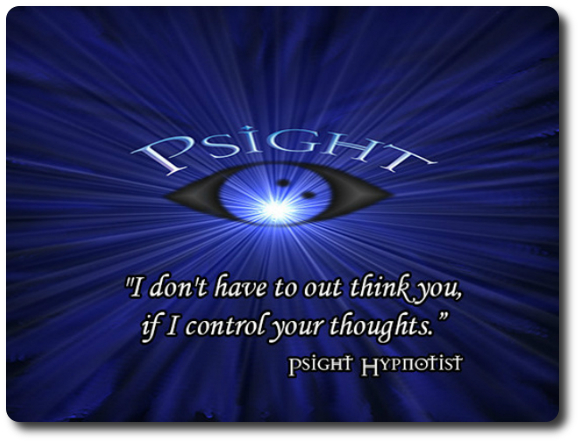
The Basics:
- For ages 8 and up (publisher suggests 13+)
- For 2 to 4 players
- Approximately 30 minutes to complete
Geek Skills:
- Active Listening & Communication
- Counting & Math
- Pattern/Color Matching
- Cooperative & Team Play
- Hand/Resource Management
Learning Curve:
- Child – Easy
- Adult – Easy
Theme & Narrative:
- Battle against other psychics to become the best in your secret order of Psi-Guardians
Endorsements:
- Gamer Geeks rejected!
- Parent Geek approved!
- Child Geek rejected!
Overview
The Seer looked through time and space, the past and future, to see what would become of us all. There, in the mind’s eye of the Seer, a great war was observed. This was our fate and nothing we could do would change it, but there was much we could do to prepare. Searching the globe for talented individuals with the gift to use their mind like a weapon, the Seer gathered psychics to train to one day be guardians. The war was generations away, but there was no time to lose. Training must begin immediately to strengthen and protect us all from the darkness that was coming.
Psight, by DarkLyght Games, is comprised of 26 Psight cards, 40 Domain cards (divided into 4 different domains, 10 cards per domain), 4 Dominance cards and 1 Seer card for a total of 71 cards. As this is a review of a prepublished game, we will not comment on the game component quality.
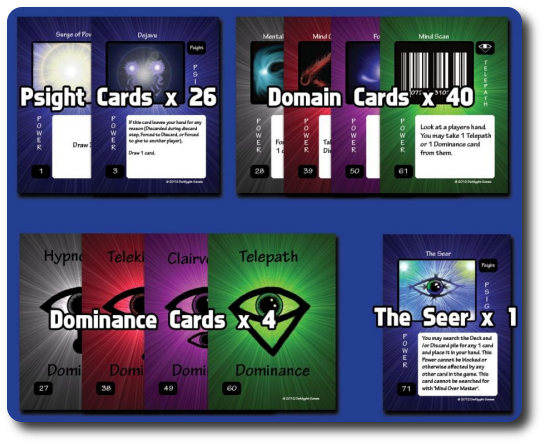
Game Set Up
To set up the game, simply shuffle the deck of cards and deal out to each player five cards. The first card is face up and the remaining four are face-down. The rest of the deck is placed to one side of the gaming area and should be within easy reach of all the players. This is the Draw deck.
The player who has the highest numbered face-up card is the first player. All players now pick up their cards to create their initial hand. Players should keep their cards hidden from their opponents at all times for the duration of the game.
You are now ready to play.
The Powers That Be
The deck of cards is broken down into four major domains and 1 universal category. The four major domains are Hypnotist, Telepath, Clairvoyant, and Telekinetic. Eventually, a player will find and be able to play a Dominance card. There are four Dominance cards in the deck, 1 per major domain. The players are free to play Domain cards from the four major domains until such time a player plays a Dominance card in front of them. At that time, no player can play a Domain card of the matching Dominance card unless they own it; however, previously played Domain cards remain in play.
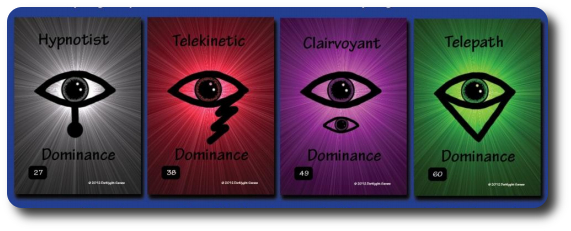
The generic category is that of Psight. This represents the most mundane of mental abilities and is not attached to any specific domain of power. Players can play Psight cards throughout the entire game and are never blocked from doing so because of another player’s Dominance card.
The Psight and Domain cards provide the player with Powers and Abilities. Abilities are put in play in front of the player and can be used by the player whenever the Ability allows. Powers are used and spent immediately, being used on the player’s turn and this discarded. Beyond a player’s powers or abilities is their capacity for memory. Memory cards are played like Ability cards and become active when a specific condition in the game is met or are used and remain “active” for the duration of the game. Ability and Power cards can be blocked and can either be used once per turn or are considered in effect for the duration of the game, depending on the ability.
A Battle of Wills
On their turn, a player will complete 5 sequential phases. These are as follows:
Phase 1: Recoup
At the beginning of the player’s turn, all used Abilities become available. When Abilities are used, they are turned over to indicate that they are still in play, but no longer available for use. When playing the first round of the game, this phase is skipped.
Phase 2: Draw
By default, the player can draw 1 card from the Draw deck. Power and Ability cards allow the player to draw more than one card during the game if played. Drawn cards are added to the player’s hand.
Phase 3: Play
The player can play any number of Power cards and up to 1 Memory card, 1 Ability card, and 1 Domain card, with a limit of 2 Memory and Ability cards in play and 1 Domain card in play for each player. If a Domain card has been played by an opponent, the player cannot play Power or Ability cards that match that Domain, but they can continue to play Psight cards. Power cards do not count towards card play limits as they are played and immediately discarded.
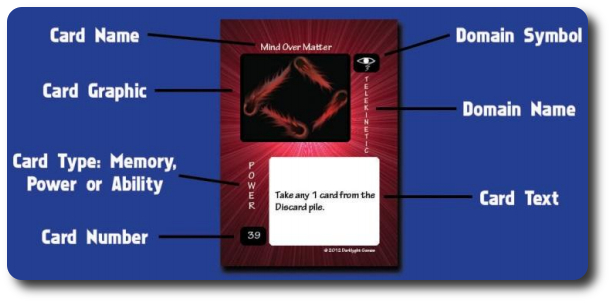
Phase 4: Discard
A player must discard down to 7 cards in their hand, placing any discarded cards to the Discard pile (located next to the Draw deck).
Phase 5: End Turn
The player’s turn is now done and the next player going clockwise begins with phase 1, as noted above. The very first round of play is referred to as the “Prep Round”. During this round, phase 1 is ignored and any card with an effect that causes another player to reduce their hand or discard a card are illegal to play. If a player ever finds themselves with no cards in their hand during this phase, they are out of the game.
Mental Victory
The game continues until only one player is left with cards. It doesn’t matter how many cards they have as long as all the other players have none. The last remaining player with cards in their hand is the winner of the game.
Game Variant
A normal game consists of 2 to 4 players where all the players are competing against each other. If preferred, a team play game variant is provided that allows two teams with two players each to compete against each other. The game set up and play are similar to the normal game except that players on the same team share a domain’s dominance. For example, if one player on the team played the Telepathy Dominance card and the other player played the Clairvoyant Dominance card, the two team members would be the only ones in the game to play cards from these two domains. Victory is only won when both players of a team have been defeated.
To learn more about Psight and read the full rules, visit the game’s Kickstarter campaign or the game’s official web page.
Prediction
Games that focus on hand management and variable player powers are well-known by our test groups. Psight is bringing little to the table that would suggest that any of the players will have a hard time playing the game. The game itself is not terribly difficult and the test groups have had a number of hours with other games that use similar mechanics. For example, Gubs. The only area that really needs to be focused on is the many different actions the player can take. This is important for two reasons. First, knowing about the different cards in the game will allow the player to make better choices on how to play the cards they have. Second, since hand management is a must, the players need to know what cards work best with others, in both offensive and defensive terms. If the time is not spent going through the cards briefly, the first game is more or less a complete waste of time as the player fumble blindly through it.
That’s no fun for anyone.
Teaching the game takes all of a few minutes. Briefly going over the different types of cards (Memory, Ability, and Power) only takes a few minutes more. In total, I spent all of 3 to 4 minutes teaching and going through the game with my Parent and Gamer Geek groups and about 10 minutes with the Child Geeks. The Child Geeks had more questions and were particularly concerned about what would happen when they had a lot of cards they could not use.
Once all the questions were asked and answers were given, we were ready to play our first game. As Psight requires the player to know how to read, my 5-year-old opted to play as a partner while my 8-year-old went solo. As I dealt out the hand, I asked both my little geeks their thoughts on the game so far.
“Cool idea. Mind warriors is something we haven’t played with yet.” ~ Liam (age 8)
“Can we make other people do things with the cards, Daddy? Can we make Liam pick up my room?” ~ Nyhus (age 5)
Let’s play and see if this game is pleasing to the mind or a real headache.
Final Word
The game was lukewarm at best with the Child Geeks. While they had no problem playing the game, they had no real understanding of what the cards represented. Again we see how important theme and narrative can be to the Child Geek test group. They might fully understand how to play and even win the game, but if they don’t feel involved in the game’s story, they seldom enjoy it. This was the case for Psight. An easy game for the Child Geeks to play, but they did not find it to be a game the engaged them. When I asked my oldest little geek why he wouldn’t want to play it again, he shrugged and said, “I don’t know…I guess it’s because I don’t feel like I am doing anything other than playing cards.”
Parent Geeks didn’t have any problem playing the game or understanding the game’s context. The vast majority enjoyed it and found it to be a fast and challenging, but hardly difficult, casual card game. With typical games taking less tan 30 minutes and the random card draws making players change their strategies each game, they happily played several games in a row without getting tired of it. Non-gamers and Parent Geeks who did not enjoy the game felt disconnected from the theme in the same way the Child Geeks did.
Gamer Geeks had no problem understanding the game or theme, but found the entire game play experience to be forgettable They did remark that the use of Dominance cards to block other players was an interesting touch, but did not do much in the way of making the game entertaining. “It’s just a roadblock”, said one Gamer Geek. Roadblock or no, the Gamer Geeks quickly overcame it and then put the game aside.
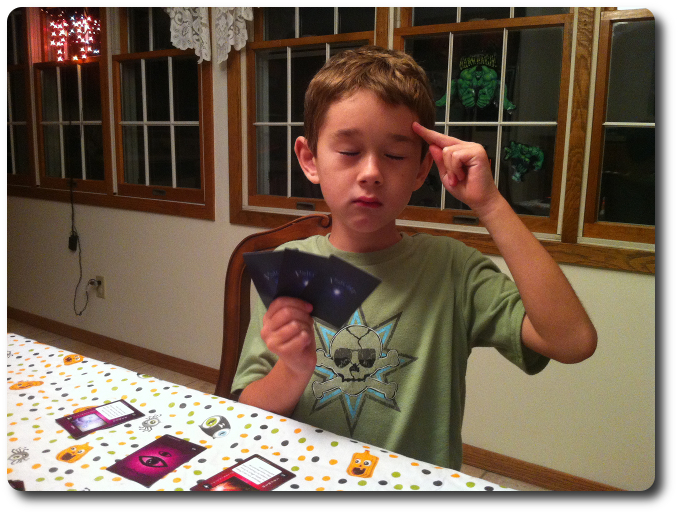
My little geek predicts my next move with the powers of his awesomeness
Gamer Geeks, Psight uses tried and true hand management and variable player power game mechanisms that many of you are already very familiar with. The game brings little to your game table that would be considered “new”. For those of you who enjoy the conceptual theme and narrative of battling an epic war with the power of the mind, Psight is sure to please. But game play is nothing spectacular. The lack of any deep strategy and tactics makes each game feel like you are only able to make choices based on the cards you have. When players establish dominance in one of the four domains, your choices become even more limited. A good game for quick fillers, but not a game that will leave you or your fellow gamer elitists feeling satisfied.
Parent Geeks, your peer group found this game to be fast and fun, a bit challenging without being terribly difficult, and casual with just the right mix of player interaction without requiring a lot focus. For those Parent Geeks who had little geeks running around the house making noise in the background, Psight was played without issue. The team play variant was also well received as it allowed two parents to team up with (or against) their other family members. Because this game provided fun, was fast, casual, and made everyone in the family and in your peer group smile, this game is approved for your mental consumption.
Child Geeks, this is not a difficult game to learn how to play. The cards tell you what you can or cannot do and timing is broken down into “play now” or “play later”. But your peer group had difficulty connecting to the game’s theme and narrative. Mind powers are not something that a typical Child Geek knows much about, and as this game is all about that, you’ll find yourself looking less and less at the card’s title and more and more about how to use it. At which point, the game becomes nothing more than an exercise in reading a card and then playing a card.
Psight is a card game I can pick up, slap in my bag, and teach to just about anyone in 5 or less minutes. This makes it perfect for quick games with just about anyone and would lead some to believe the game is a sure winner. For me, though, it is not. Psight has a unique theme and narrative, but the game rules, play, and cards do little to develop or explore it. This results in a game play experience that is very formulaic and every player’s move becomes somewhat predictable. You can bet that your average player will play a Dominance card as soon as possible to lock the other players out and then attempt to simply stay afloat longer with more cards than the rest. The problem is, after two Dominance cards are played out, half of the Domain cards become unplayable. Once all four Dominance cards are played, a player only has access to a fourth of the Domain cards. The Psight cards can always be played, but the total number of these cards is limited. The end result, most of the time, is a hand of cards you can’t do anything with towards the end of the game. Frustrating. The saving grace is that games don’t take too long and a new game can start quickly with just a shuffle of cards. This ensures that everyone has a second chance for a better game in no time.
I tend to lose interest in games like this, especially when it becomes obvious to me that the game is inherently limited. Yes, there are some choices to be made and yes, there are some tactics, but not much and not to any meaningful or rewarding depth. What choices you can make and tactics you can use are all based on random card draws. As the game continues, the number of choices and tactics available quickly dwindles. I wanted the game to give me time to explore it, to stress test it, and get comfortable in its methodology. Instead, Psight never really let me experience it as there was always a portion locked off. For me, that’s not much fun.
But perhaps it is for you. If you are looking for a card game where light hand management and random player powers are set in a world where you play as a psychic warrior, then do focus your mind’s eye on Psight.
This game was given to Father Geek as a review copy. Father Geek was not paid, bribed, wined, dined, or threatened in vain hopes of influencing this review. Such is the statuesque and legendary integrity of Father Geek.




Hmm…
Doesn’t sound like a great game, nor does it sound like a bad game. Just a “blah” game. I don’t need anymore of those. Is there a game you think I should invest in on Kickstarter?
Yes, those were my own personal thoughts, too. But we make sure to bring out all the comments (positive and negative) from our test groups.Otherwise, what good are they? The level of game endorsement noted at top is based on THEIR experience, not mine. I give you my final and personal thoughts at the end of the review. Please take them only as an opinion. And, hey, everyone has opinions. Mine are not special or more important than the next persons.
As far as what you should or should not invest in on Kickstarter, all the games I was personally interested in are either no longer available or have not yet started.
Thanks for reading!
Cyrus,
Thank you for posting your review of our company’s first game. While we certainly realize our game is not for everyone, we were a little disappointed that it was not received as well by all of your play groups as it has been by other blind play groups.
I want to personally thank you and all of the people involved in your play groups for taking their time to play our game and hopefully in the future we will have something more suited to their tastes that all of your groups will enjoy.
Happy Gaming my Friend!
Well done, Jason, well done.
Every first game has a lot riding on it. While your game was not loved by all our players, it was most certainly not hated. A number of our players enjoyed it and wanted to play the game again as soon as possible. Our Parent Geek group, for example, very much enjoyed it and the game continues to be asked for. While the goal should always be to create the “best game ever”, let us not forget that any game that is played and entertains its audience is most certainly a great success.
Looking forward to seeing what your company brings to the gaming table in the future!